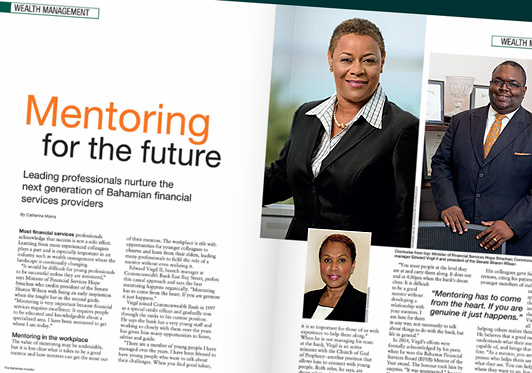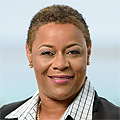| Published: Date: Updated: Author: |
The Bahamas Investor Magazine July 28, 2016 July 28, 2016 Catherine Morris |
Most financial services professionals acknowledge that success is not a solo effort. Learning from more experienced colleagues plays a part and is especially important in an industry such as wealth management where the landscape is continually changing.
“It would be difficult for young professionals to be successful unless they are mentored,” says Minister of Financial Services Hope Strachan who credits president of the Senate Sharon Wilson with being an early inspiration when she taught her in the second grade. “Mentoring is very important because financial services requires excellence. It requires people to be educated and knowledgeable about a specialized area. I have been mentored to get where I am today.”
Mentoring in the workplace
The value of mentoring may be undeniable, but it is less clear what it takes to be a good mentor and how mentees can get the most out of their mentors. The workplace is rife with opportunities for younger colleagues to observe and learn from their elders, leading many professionals to fulfil the role of a mentor without even realizing it.
Edward Virgil II, branch manager at Commonwealth Bank East Bay Street, prefers this casual approach and says the best mentoring happens organically. “Mentoring has to come from the heart. If you are genuine it just happens.”
Virgil joined Commonwealth Bank in 1997 as a special credit officer and gradually rose through the ranks to his current position. He says the bank has a very young staff and working so closely with them over the years has given him many opportunities to listen, advise and guide.
“There are a number of young people I have managed over the years. I have been blessed to have young people who want to talk about their challenges. When you find good talent, it is so important for those of us with experience to help them along.”
When he is not managing his team at the bank, Virgil is an active minister with the Church of God of Prophecy—another position that allows him to connect with young people. Both roles, he says, are about relationships.
“You meet people at the level they are at and carry them along. It does not end at 4:30pm when the bank’s doors close. It is difficult to be a good mentor without developing a relationship with your mentees. I am here for them in any way, not necessarily to talk about things to do with the bank, but life in general.”
In 2014, Virgil’s efforts were formally acknowledged by his peers when he won the Bahamas Financial Services Board (BFSB) Mentor of the Year award. The honour took him by surprise. “It was unexpected,” he says. “I was not looking for recognition. I was just doing what I love to do.”
His colleagues gave him glowing reviews, citing his patience with younger members of staff, his supportive approach and the time he invested in them. For Virgil this is all part of helping others realize their potential. He believes that a good mentor understands what their mentee is capable of, and brings that to the fore. “As a mentor, you are the person who helps them see beyond what they see. You can help them where they want to go, but then find out they can do so much more and be so much more. You have to find ways to embolden them.”
Emboldening his mentees sometimes requires a tough approach, according to Virgil. “I intentionally put them in positions to help them grow.” This might include urging a shy colleague to make a presentation, or having an inexperienced worker tackle a difficult problem on their own. “I let them know I am there for them, but I encourage them to do things for themselves.”
Structured mentoring
Cheryl Cartwright, consultant counsel at Callenders & Co law firm in Nassau, calls this subtle approach “mentoring by osmosis” and says she benefited from this kind of mentoring when studying under lawyers Colin Callender, Michael Scott and Lester Mortimer. The role of a mentor is to be a source of support and encouragement, according to Cartwright, who says the best mentors are those who show “personal curiosity, an open mind and a genuine desire to see that person improve or succeed.”
Like Virgil, she believes sometimes the younger generation needs a well- timed “nudge” to get them on track. “I give them a gentle nudge. I ask what else they can be doing to improve themselves; to make themselves more competitive; to take charge of their role in financial services. You have to keep challenging your comfort zone, to be constantly learning, changing and progressing.”
Thanks to her work as a lecturer with the Eugene Dupuch Law School, Cartwright had already been moulding young minds for over a decade when she joined a formal mentoring programme in 2015. She was meeting with the BFSB to discuss ways to encourage young lawyers into the financial services sector when they suggested she join their newly- formed Millennials Society as a mentor. Cartwright agreed and was quickly paired with a young attorney. “It has been a pure joy. It has been a really good match.”
The BFSB recommends mentors meet their mentees at least once a month and provides a schedule of events that both can attend together such as seminars or presentations. Cartwright and her mentee try to meet monthly, but scheduling is often a difficulty. When they do meet, Cartwright says she likes to keep it informal and sociable so it feels less like a business meeting and more like a friendly chat: “We have lunch at different places downtown every time. It is very ad hoc. We deal with rigid business stuff all day, we don’t want to add to that.”
The pair often discuss the younger lawyer’s future, with Cartwright sharing experiences from her own varied career. “I share my experiences on the margins of the law and how there are opportunities not just in legal firms, but spin-offs where your law degree is helpful.”
Legal advice
Cartwright began her career more than 20 years ago at Callenders & Co as a commercial litigator, but in 1999 left law to become a compliance manager with Barclays Bank. After several years in compliance, during which time she became the founding vice-president of the Bahamas Association of Compliance Officers, she returned to Callenders to specialize in commercial transactions.
While practising as a litigator Cartwright also acted as a pupil master for several attorneys at the start of their legal careers. “When the students come up to you and thank you, that’s when you realize that it has made an impact and how personal it is for them,” she says.
Whether giving advice to her students or her mentee, Cartwright is consistent on one thing–the need to travel abroad. She believes that this kind of experience is invaluable and will help the younger generation of financial services professionals not only broaden their skills, but also prove that The Bahamas can compete on a global level. “I enjoy seeing Bahamians go from strength to strength. The world is extremely competitive and it is becoming more difficult for young Bahamians to find a place, and excel in that place. One of the elements needed to ensure the sustainability of the financial services industry is energetic, intelligent, educated and well-exposed professionals. Experience outside the jurisdiction is viewed very favourably.”
Cartwright wants to see more professionals becoming mentors in the sector, but acknowledges that one of the biggest challenges is finding the time. “Time constraints are a big challenge. People may be mentoring in their own way; they may be mentoring family or others they are connected to. To take on a person and actively say ‘that is my mentee,’ most people would say they are too busy for that.”
Investing in talent
Both Cartwright and Virgil agree that mentoring is worth the time, as the benefits are far-reaching. Cartwright believes it is key to sustaining the industry saying: “You need to invest in the next generation, and hopefully that generation will be better than the one that preceded it, so The Bahamas can grow and compete.”
“These are the people we are going to leave in place when we retire,” says Virgil, who wants to stay involved even when he leaves the workforce by pursuing higher education and lecturing. “Young people have a lot of challenges. The biggest difficulty is getting them to believe in themselves so it is not just you believing in them. Mentoring is a responsibility and a privilege. You have the opportunity to impact the life of someone else. The hours we spend together on a daily basis make a difference. To the young professionals coming up, the example you set transcends the four walls of the bank. These people impact society.”










